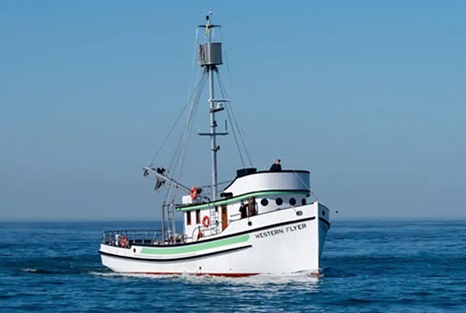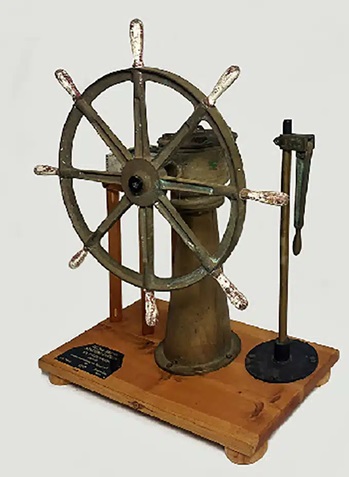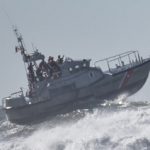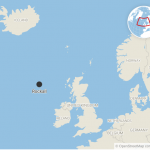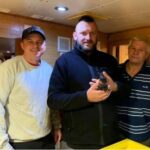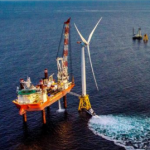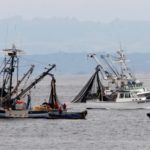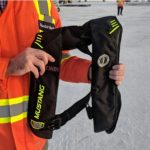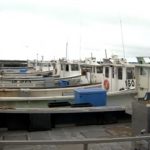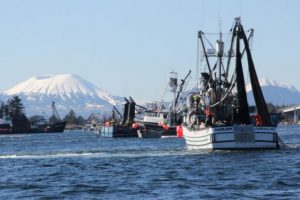Category Archives: Pacific
An update on the start of Dungeness crab season is coming next week
 At the end of next week, the California Department of Fish and Wildlife (CDFW) will determine whether or not to open the commercial Dungeness crab season on Dec. 1 or postpone it for a second time until at least Dec. 22. In late October, an initial assessment by the California Department of Fish and Wildlife pushed back the first day of commercial Dungeness crab season from its traditional mid-November opening to Dec. 1, pending another assessment, due to an abundance of humpback whales off the coast of California. On Friday, the CDFW announced that director Charlton Bonham will conduct a second assessment on the risk of marine entanglement on or around Nov. 21. more, >>CLICK TO READ<< 06:59
At the end of next week, the California Department of Fish and Wildlife (CDFW) will determine whether or not to open the commercial Dungeness crab season on Dec. 1 or postpone it for a second time until at least Dec. 22. In late October, an initial assessment by the California Department of Fish and Wildlife pushed back the first day of commercial Dungeness crab season from its traditional mid-November opening to Dec. 1, pending another assessment, due to an abundance of humpback whales off the coast of California. On Friday, the CDFW announced that director Charlton Bonham will conduct a second assessment on the risk of marine entanglement on or around Nov. 21. more, >>CLICK TO READ<< 06:59
Will Trump’s win end Morro Bay offshore wind energy projects?
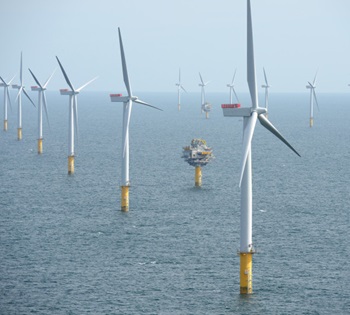 President-elect Donald Trump has vowed to end offshore wind energy projects his first day in office, a promise opponents of the proposed Morro Bay offshore wind farms hope he fulfills. Trump ran on lowering housing and energy costs. During his campaign speeches, he described offshore wind energy as “the most expensive energy there is.” He noted environmental concerns such as whale and bird deaths. In Dec. 2022, an auction for three offshore wind energy sites located off the coast near Morro Bay netted over $400 million to the federal government. The plan is to have the wind turbines float in the ocean more than 20 miles off the coast, with the electricity sent ashore via cables along the ocean floor. While the majority of San Luis Obispo County residents initially supported the “green energy” project, sentiments changed as information regarding plans to industrialize Port San Luis near Avila Beach and portions of the Morro Bay waterfront spread through the community. more, >>CLICKTO READ<< 09:55
President-elect Donald Trump has vowed to end offshore wind energy projects his first day in office, a promise opponents of the proposed Morro Bay offshore wind farms hope he fulfills. Trump ran on lowering housing and energy costs. During his campaign speeches, he described offshore wind energy as “the most expensive energy there is.” He noted environmental concerns such as whale and bird deaths. In Dec. 2022, an auction for three offshore wind energy sites located off the coast near Morro Bay netted over $400 million to the federal government. The plan is to have the wind turbines float in the ocean more than 20 miles off the coast, with the electricity sent ashore via cables along the ocean floor. While the majority of San Luis Obispo County residents initially supported the “green energy” project, sentiments changed as information regarding plans to industrialize Port San Luis near Avila Beach and portions of the Morro Bay waterfront spread through the community. more, >>CLICKTO READ<< 09:55
NCLA Challenges WA Dept. of Fish and Wildlife’s Illegal 24-Hour Surveillance of Crabbing Boats
 The New Civil Liberties Alliance has filed a lawsuit against the Washington Department of Fish and Wildlife’s Electronic Monitoring Program using GPS technology to constantly track the location and movements of every state-licensed boat that fishes for Coastal Dungeness Crab, whether they are crabbing or not. The Department sustains the program by forcing fishermen to pay for electronic monitoring systems that they must install on their boats or else face criminal sanctions. Representing local crab fishing boat Captains Sara Franey, Brent Young and Mark Young, NCLA asks the Washington Superior Court to stop this unconstitutional surveillance regime, which does not improve upon cheaper, less intrusive existing methods for monitoring crab stocks. links, more, >>CLICK TO READ<< 18:05
The New Civil Liberties Alliance has filed a lawsuit against the Washington Department of Fish and Wildlife’s Electronic Monitoring Program using GPS technology to constantly track the location and movements of every state-licensed boat that fishes for Coastal Dungeness Crab, whether they are crabbing or not. The Department sustains the program by forcing fishermen to pay for electronic monitoring systems that they must install on their boats or else face criminal sanctions. Representing local crab fishing boat Captains Sara Franey, Brent Young and Mark Young, NCLA asks the Washington Superior Court to stop this unconstitutional surveillance regime, which does not improve upon cheaper, less intrusive existing methods for monitoring crab stocks. links, more, >>CLICK TO READ<< 18:05
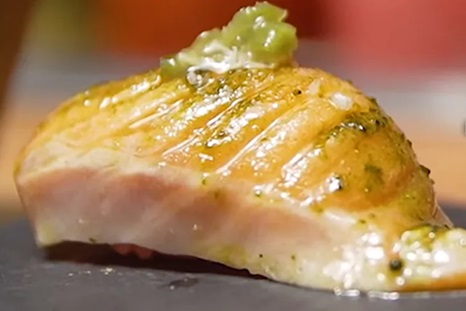
Study Reveals Salmon Mislabeling in Seattle Sushi Restaurants
Researchers conducted a study on salmon samples from 67 grocery stores and 52 local sushi shops, revealing that 32.3% of sushi restaurant samples contained farmed salmon instead of the wild salmon that vendors claimed. It remains unclear whether this mislabeling occurred at the restaurant level or earlier in the distribution chain. In contrast, no grocery store samples were found to have this issue, although 11.1% of the salmon sold in grocery stores was identified as the incorrect species. Additionally, 38% of the samples from restaurants were substituted with the wrong type of salmon. The financial implications for consumers are significant. When customers believe they are purchasing high-quality wild salmon, they may be willing to pay a higher price, not realizing they are receiving a less valuable product. This not only affects consumer trust but can also undermine the market for legitimate wild-caught salmon fishermen, who depend on consumers recognizing the value of their sustainably sourced fish. more, >>CLICK TO READ<< 11:44
Supporters, Opponents of Offshore Wind Both Look for Hopeful Signs in Trump Administration
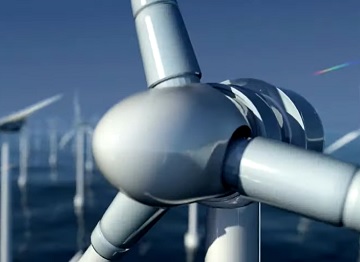 On the day after the elections last week, and even before, the airwaves were crammed with speculation about how this, that, and the other sectors of American life and the economy would fare under a Trump administration. The chatter included the future of offshore wind, which was born in the United States in 2016 off the coast of Block Island and continues to generate heavy support and heavy opposition. President-elect Donald Trump has expressed hostility toward offshore wind and has said he would put an end to the industry “on day one” of his administration. Trump-supporting Republicans have vowed to put an end to President Joe Biden’s 2022 Inflation Reduction Act, including tax credits for big projects such as offshore wind. A large share of the IRA’s $891 billion price tag is targeted toward renewable energy and related technologies. more, >>CLICK TO READ<< 07:53
On the day after the elections last week, and even before, the airwaves were crammed with speculation about how this, that, and the other sectors of American life and the economy would fare under a Trump administration. The chatter included the future of offshore wind, which was born in the United States in 2016 off the coast of Block Island and continues to generate heavy support and heavy opposition. President-elect Donald Trump has expressed hostility toward offshore wind and has said he would put an end to the industry “on day one” of his administration. Trump-supporting Republicans have vowed to put an end to President Joe Biden’s 2022 Inflation Reduction Act, including tax credits for big projects such as offshore wind. A large share of the IRA’s $891 billion price tag is targeted toward renewable energy and related technologies. more, >>CLICK TO READ<< 07:53
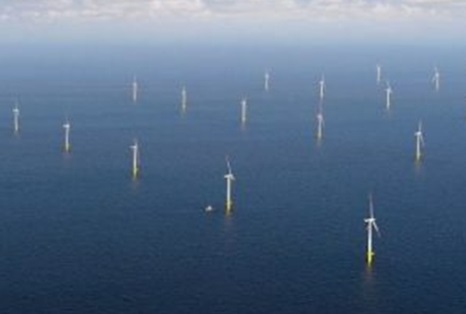
GOP Lawmakers, Fishermen Urge Trump to Keep Promise to Axe Offshore Wind
Trump’s return to the Oval Office may deal the problem-riddled offshore wind industry another blow if his administration follows through on his pledge to scrap federal support for offshore wind projects during his second term. Republican lawmakers, opposed to heavily subsidized green energy, and commercial fishermen, who view the industry as an existential threat to their livelihoods, are calling on the president-elect to follow through on his campaign’s promise, which could imply ending federal subsidies and lease sales for the industry. “The incoming administration has an historic opportunity to save American workers from foreign developers, reinvigorate iconic coastal towns, and improve America’s food security,” NEFSA CEO Jerry Leeman said in a press release following Trump’s election win. more, >>CLICK TO READ<< 06:54
Charting a course toward seafood independence for Alaska’s vulnerable food systems
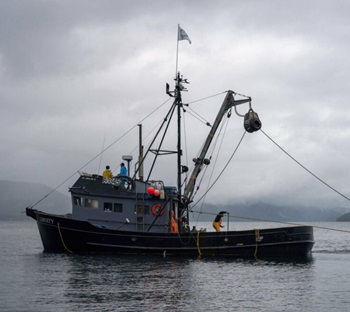 As a commercial fisherman based in Sitka and the executive director of the Alaska Longline Fishermen’s Association (ALFA), I’ve spent decades navigating Alaska’s challenging waters and the headwinds facing our fishing communities. Alaska’s coastal residents are resilient, but they are up against a new magnitude of challenges. The loss of fishing access and community-based processing capacity, along with a dearth of local markets for seafood, are straining once vibrant fishing economies up and down our coastline. I recently contributed to a fisheries access report commissioned by the Alaska Sustainable Fisheries Trust (ASFT), which highlights the outmigration of fishing access in Southeast Alaska. Communities with historically robust local fishing fleets now see few active vessels based in town. This trend is acute in communities such as Kake, which has lost its local processor — and with it, a viable market for resident fishermen. Through interviews and in-person engagement, ASFT’s report found that a common concern among fishermen was the loss of a local fish buyer. When this happens, resident fishermen often sell their permits or abandon fishing altogether. more, >>CLICK TO READ<< By Linda Behnken 12:05
As a commercial fisherman based in Sitka and the executive director of the Alaska Longline Fishermen’s Association (ALFA), I’ve spent decades navigating Alaska’s challenging waters and the headwinds facing our fishing communities. Alaska’s coastal residents are resilient, but they are up against a new magnitude of challenges. The loss of fishing access and community-based processing capacity, along with a dearth of local markets for seafood, are straining once vibrant fishing economies up and down our coastline. I recently contributed to a fisheries access report commissioned by the Alaska Sustainable Fisheries Trust (ASFT), which highlights the outmigration of fishing access in Southeast Alaska. Communities with historically robust local fishing fleets now see few active vessels based in town. This trend is acute in communities such as Kake, which has lost its local processor — and with it, a viable market for resident fishermen. Through interviews and in-person engagement, ASFT’s report found that a common concern among fishermen was the loss of a local fish buyer. When this happens, resident fishermen often sell their permits or abandon fishing altogether. more, >>CLICK TO READ<< By Linda Behnken 12:05

Trump Defeats Harris to Win a Second White House Term
Former President Donald Trump was elected the 47th president of the United States on Wednesday, mounting one of the greatest political comebacks of all time – a convicted felon who was twice impeached and left the presidency in disgrace just four years ago, only to win it back decisively in one of the most fraught elections in modern history. In defeating Vice President Kamala Harris, Trump stitched together an improbable coalition of supporters, including people of color and young voters, while promising to unfurl an America-first vision. With his victory all but assured early Wednesday morning, Trump told cheering supporters at a convention center in West Palm Beach, Florida, that “this was a movement like nobody’s ever seen before.” more, >>CLICK TO READ<< 07:41
WHALES DECLARE BOEM IS A TERRORIST ORGANIZATION COMMITTING GENOCIDE By Jim Lovgren
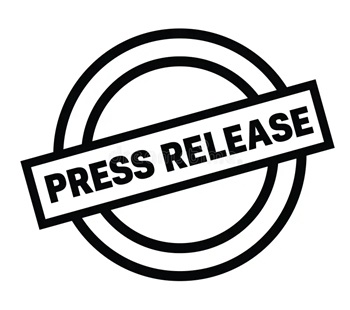 In a press release issued today by the AAA, an aquatic coalition of many different marine creatures, it was declared that the United States Bureau of Ocean Energy Management was a terrorist organization intent on the extermination of all marine mammals and other sea life. The National Marine Fishery Service was named as a co-conspirator, for standing by and watching, instead of doing their legally required job of protecting endangered species. The AAA, Aquatic Animals Association, is a newly formed coalition of different marine species including Whales, Dolphins, Turtles, fish, clams, and scallops. Despite the vast disparity in their abilities to communicate with each other, they have combined each other’s unique communication forms into one voice in hopes of saving themselves from extinction. From Harvey Haddock, President, Aquatic Animal Association. more, >>CLICK TO READ<< 17:14
In a press release issued today by the AAA, an aquatic coalition of many different marine creatures, it was declared that the United States Bureau of Ocean Energy Management was a terrorist organization intent on the extermination of all marine mammals and other sea life. The National Marine Fishery Service was named as a co-conspirator, for standing by and watching, instead of doing their legally required job of protecting endangered species. The AAA, Aquatic Animals Association, is a newly formed coalition of different marine species including Whales, Dolphins, Turtles, fish, clams, and scallops. Despite the vast disparity in their abilities to communicate with each other, they have combined each other’s unique communication forms into one voice in hopes of saving themselves from extinction. From Harvey Haddock, President, Aquatic Animal Association. more, >>CLICK TO READ<< 17:14
Election Jitters, Industry Headwinds Undermine Biden’s Final Offshore Wind Auction
 A U.S. auction of offshore wind development rights in the Gulf of Maine on Tuesday drew bids for only half of the eight offered leases, for a total of just $21.9 million in high bids, in the latest sign of deep industry malaise. The sale was a stark display of the lack of industry appetite for new investment after a year of high-profile setbacks that include canceled projects, two shelved lease sales in Oregon and the Gulf of Mexico and a construction accident at the nation’s first major offshore wind project. The auction was the last before President Joe Biden, a Democrat, leaves office in January. more, >>CLICK TO READ<< 07:25
A U.S. auction of offshore wind development rights in the Gulf of Maine on Tuesday drew bids for only half of the eight offered leases, for a total of just $21.9 million in high bids, in the latest sign of deep industry malaise. The sale was a stark display of the lack of industry appetite for new investment after a year of high-profile setbacks that include canceled projects, two shelved lease sales in Oregon and the Gulf of Mexico and a construction accident at the nation’s first major offshore wind project. The auction was the last before President Joe Biden, a Democrat, leaves office in January. more, >>CLICK TO READ<< 07:25
Lifelong Commercial Fisherman Army Veteran Theodore “Ted” Reed Merrell III, of Juneau, has passed away
 Theodore “Ted” Reed Merrell III, 76, died at his Fritz Cove home on October 16, 2024 after a long struggle with Progressive Supranuc Palsy (PSP). Ted and Lucy were engaged while Ted was on R&R in Hawaii and after discharge, they were married in Minnesota. They headed to Juneau as soon as Lucy graduated, driving Ted’s hot orange 1970 stick-shift Dodge Charger R/T. Ted soon got his own boat–an open 19-footer –and began a lifelong career in commercial fishing. Other boats followed: Diamondtooth (an ancient wooden gillnetter), Onni (a fast bowpicker with troublesome twin Volvo engines), Invictus, and for most of his career, the 45-foot Dundas. Ted had permits in many fisheries and tried crab, herring, and salmon gillnetting and finally settled into longlining and trolling, often accompanied by his son, Nelson. He fished all over the Northern Panhandle and especially liked downtime with friends in the fishing village, Elfin Cove. more, >>CLICK TO READ<< 15:44
Theodore “Ted” Reed Merrell III, 76, died at his Fritz Cove home on October 16, 2024 after a long struggle with Progressive Supranuc Palsy (PSP). Ted and Lucy were engaged while Ted was on R&R in Hawaii and after discharge, they were married in Minnesota. They headed to Juneau as soon as Lucy graduated, driving Ted’s hot orange 1970 stick-shift Dodge Charger R/T. Ted soon got his own boat–an open 19-footer –and began a lifelong career in commercial fishing. Other boats followed: Diamondtooth (an ancient wooden gillnetter), Onni (a fast bowpicker with troublesome twin Volvo engines), Invictus, and for most of his career, the 45-foot Dundas. Ted had permits in many fisheries and tried crab, herring, and salmon gillnetting and finally settled into longlining and trolling, often accompanied by his son, Nelson. He fished all over the Northern Panhandle and especially liked downtime with friends in the fishing village, Elfin Cove. more, >>CLICK TO READ<< 15:44
Fire heavily damages fishing boat at Squalicum Harbor in Bellingham
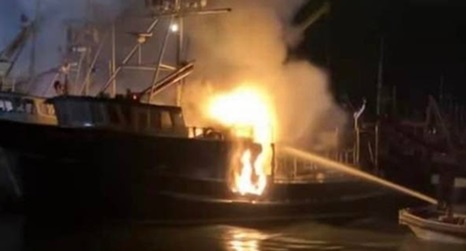 A 68-foot fishing boat was heavily damaged by fire early Sunday as it was moored in Squalicum Harbor. Bellingham’s fireboat the Salish Star is moored in the marina nearby and poured water on the blaze, Michaelis told The Bellingham Herald in a phone call. “The Salish Star made the initial attack and its crew was able to get it mostly out,” he said. The boat, called the Alaskan Girl, suffered heavy damage to the top deck, cabin and galley, Michaelis said. It remained afloat. more, >>CLICK TO READ<< 12:51
A 68-foot fishing boat was heavily damaged by fire early Sunday as it was moored in Squalicum Harbor. Bellingham’s fireboat the Salish Star is moored in the marina nearby and poured water on the blaze, Michaelis told The Bellingham Herald in a phone call. “The Salish Star made the initial attack and its crew was able to get it mostly out,” he said. The boat, called the Alaskan Girl, suffered heavy damage to the top deck, cabin and galley, Michaelis said. It remained afloat. more, >>CLICK TO READ<< 12:51
“A Total Shock” – Japanese Sardines Detected in U.S. Waters
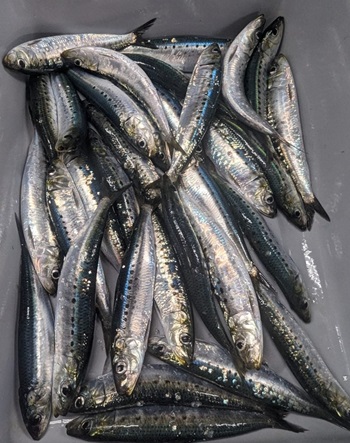 Genomic sequencing of Pacific sardines in 2022 and 2023 uncovered the presence of not just one, but two distinct sardine species in the California Current. When research scientist Gary Longo first reviewed the results of his genomic analysis of sardines, he thought he must have mixed up his samples. Besides the Pacific sardines common on the West Coast, many of the fish appeared to be another species. “It was a total shock,” he said. Then he compared their genetic code to other known species. “That was the ‘aha moment’ when we realized we were looking at a second species of sardine.” The analysis shows that of the 345 sardine samples collected during NOAA Fisheries’ 2021 and 2022 Coastal Pelagic Species Surveys, all of the fish in 2021 were Pacific sardines, but those collected in 2022 were a mix of Pacific sardines and Japanese sardines. more, >>CLICK TO READ<< 10:50
Genomic sequencing of Pacific sardines in 2022 and 2023 uncovered the presence of not just one, but two distinct sardine species in the California Current. When research scientist Gary Longo first reviewed the results of his genomic analysis of sardines, he thought he must have mixed up his samples. Besides the Pacific sardines common on the West Coast, many of the fish appeared to be another species. “It was a total shock,” he said. Then he compared their genetic code to other known species. “That was the ‘aha moment’ when we realized we were looking at a second species of sardine.” The analysis shows that of the 345 sardine samples collected during NOAA Fisheries’ 2021 and 2022 Coastal Pelagic Species Surveys, all of the fish in 2021 were Pacific sardines, but those collected in 2022 were a mix of Pacific sardines and Japanese sardines. more, >>CLICK TO READ<< 10:50
Do you know where your fish comes from? It’s probably not Hawaiʻi
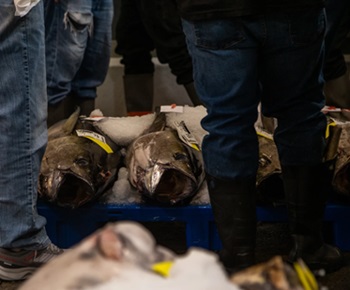 Fish is a significant part of Hawaiʻi’s food culture, and residents eat up to three times more of it per capita than the rest of the U.S. But where does all that fish come from? That’s information local commercial fishers and their advocates want more people to know. In Hawaiʻi, there’s a growing push to require stores and restaurants to label fish as locally caught or imported, including the country of origin. “I think a major misconception is what is portrayed as locally made (or) freshly made, but it’s not, and the fish is not from Hawaiʻi,” said Eric Kingma, the executive director for the Hawaiʻi Longline Association. more, >>CLICK TO READ<< 07:48
Fish is a significant part of Hawaiʻi’s food culture, and residents eat up to three times more of it per capita than the rest of the U.S. But where does all that fish come from? That’s information local commercial fishers and their advocates want more people to know. In Hawaiʻi, there’s a growing push to require stores and restaurants to label fish as locally caught or imported, including the country of origin. “I think a major misconception is what is portrayed as locally made (or) freshly made, but it’s not, and the fish is not from Hawaiʻi,” said Eric Kingma, the executive director for the Hawaiʻi Longline Association. more, >>CLICK TO READ<< 07:48
California delays commercial Dungeness crab season
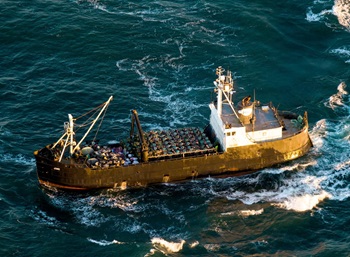 The California Department of Fish and Wildlife on Friday cited a large number of humpback whales and recent entanglements as the reason for the postponing the state’s commercial Dungeness crab season. The affected area ranges from the Sonoma-Mendocino county line in Northern California to the U.S.-Mexico border. Originally set to open Nov. 15, a new start date is tentatively scheduled for Dec. 1. However, that’s dependent on a November risk assessment and the fish and wildlife director’s determination of risk for Dungeness crab fisheries. The northernmost fishing zones, from the Oregon-California border to the Sonoma-Mendocino county line, can’t open until Dec. 1 and weren’t included in Friday’s decision. more, >>CLICK TO READ<< 06:43
The California Department of Fish and Wildlife on Friday cited a large number of humpback whales and recent entanglements as the reason for the postponing the state’s commercial Dungeness crab season. The affected area ranges from the Sonoma-Mendocino county line in Northern California to the U.S.-Mexico border. Originally set to open Nov. 15, a new start date is tentatively scheduled for Dec. 1. However, that’s dependent on a November risk assessment and the fish and wildlife director’s determination of risk for Dungeness crab fisheries. The northernmost fishing zones, from the Oregon-California border to the Sonoma-Mendocino county line, can’t open until Dec. 1 and weren’t included in Friday’s decision. more, >>CLICK TO READ<< 06:43
Offshore wind looked like a sure thing for Oregon — until it wasn’t.
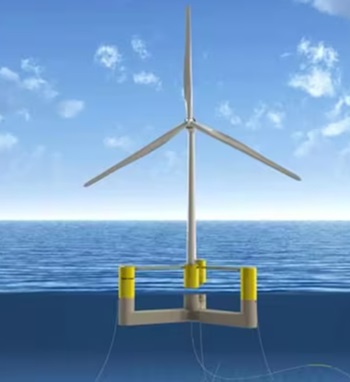 A push to bring floating offshore wind technology to the Southern Oregon coast was gaining momentum. The Oregon Department of Energy saw floating offshore wind playing a critical role in the state’s, and the region’s renewable energy goals. The Biden administration had ambitious national goals for developing offshore wind, and the Oregon Coast played a key role. For the U.S. Department of Interior’s Bureau of Ocean Energy Management, or BOEM, the years-long process of identifying areas for development and selecting potential bidders to see if the technology would work off the coast was coming to a close. And then, in a single week in late September — after years of effort, and less than three weeks before BOEM officials expected to choose a company to develop offshore wind — everything fell apart. more, >>CLICK TO READ<< 13:09
A push to bring floating offshore wind technology to the Southern Oregon coast was gaining momentum. The Oregon Department of Energy saw floating offshore wind playing a critical role in the state’s, and the region’s renewable energy goals. The Biden administration had ambitious national goals for developing offshore wind, and the Oregon Coast played a key role. For the U.S. Department of Interior’s Bureau of Ocean Energy Management, or BOEM, the years-long process of identifying areas for development and selecting potential bidders to see if the technology would work off the coast was coming to a close. And then, in a single week in late September — after years of effort, and less than three weeks before BOEM officials expected to choose a company to develop offshore wind — everything fell apart. more, >>CLICK TO READ<< 13:09
Commercial salmon fishers struggle with low prices
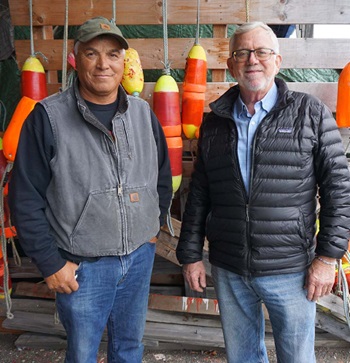 With the commercial salmon season coming to an end, 2024 is shaping up to be a lean year for commercial salmon fishers up and down the West Coast. That’s largely because prices for salmon that fishers receive at the dock are at an unusual low. Warren “Buck” Gibbons lives in Bellingham and has been fishing for sockeye in Bristol Bay, Alaska, since 1976. In a good year, Gibbons said, a Bristol Bay sockeye fisher can gross $300,000–400,000 (they take home less after expenses). But when prices are as low as they were this summer, they’ll gross about $100,000 (again, the take-home pay is less). For a fisher working on a smaller scale, including many tribal fishers, the situation is even grimmer. Dana Wilson of the Lummi Nation said that with prices so low, it hasn’t been worth selling salmon for the last couple years. He now keeps his entire catch to feed his own family and relies mostly on crab for income. more, >>CLICK TO READ<< 13:25
With the commercial salmon season coming to an end, 2024 is shaping up to be a lean year for commercial salmon fishers up and down the West Coast. That’s largely because prices for salmon that fishers receive at the dock are at an unusual low. Warren “Buck” Gibbons lives in Bellingham and has been fishing for sockeye in Bristol Bay, Alaska, since 1976. In a good year, Gibbons said, a Bristol Bay sockeye fisher can gross $300,000–400,000 (they take home less after expenses). But when prices are as low as they were this summer, they’ll gross about $100,000 (again, the take-home pay is less). For a fisher working on a smaller scale, including many tribal fishers, the situation is even grimmer. Dana Wilson of the Lummi Nation said that with prices so low, it hasn’t been worth selling salmon for the last couple years. He now keeps his entire catch to feed his own family and relies mostly on crab for income. more, >>CLICK TO READ<< 13:25
Salmon Spotted in Klamath Basin for First Time in More Than a Century
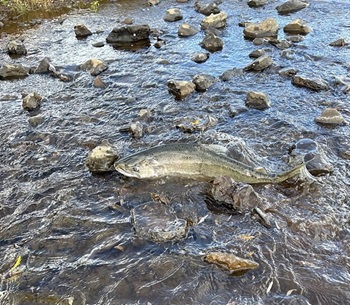 On Wednesday, an Oregon Department of Fish and Wildlife biologist spotted a first-in-a-century sight on a tributary to the Klamath River in the Klamath Basin: A fall-run Chinook salmon. Just weeks after the last remnants of the four hydroelectric dams that used to clog the lower Klamath River were hauled away, concluding what was the largest dam removal effort in United States history, the first salmon was spotted in the Klamath Basin area since 1912, when the first of the dams was installed, blocking fish passage to the hundreds of miles of historic habitat. Video, more, >>CLICK TO READ<< 10:40
On Wednesday, an Oregon Department of Fish and Wildlife biologist spotted a first-in-a-century sight on a tributary to the Klamath River in the Klamath Basin: A fall-run Chinook salmon. Just weeks after the last remnants of the four hydroelectric dams that used to clog the lower Klamath River were hauled away, concluding what was the largest dam removal effort in United States history, the first salmon was spotted in the Klamath Basin area since 1912, when the first of the dams was installed, blocking fish passage to the hundreds of miles of historic habitat. Video, more, >>CLICK TO READ<< 10:40
Biden administration races to shell out billions for clean energy as election nears
 The Biden administration is shelling out billions of dollars for clean energy and approving major offshore wind projects as officials race to secure major climate initiatives before President Joe Biden’s term comes to an end. Biden wants to establish a legacy for climate action that includes locking in a trajectory for reducing the nation’s planet-warming greenhouse gas emissions. Former President Donald Trump has pledged to rescind unspent funds in Biden’s landmark climate and health care bill and stop offshore wind development if he returns to the White House in January. Vice President Kamala Harris, who became the Democratic nominee after Biden dropped from the race this summer, has said she will pursue a climate agenda similar to Biden’s, focused on reducing emissions, deploying renewables and creating clean energy jobs. more, >>CLICK TO READ<< 09:46
The Biden administration is shelling out billions of dollars for clean energy and approving major offshore wind projects as officials race to secure major climate initiatives before President Joe Biden’s term comes to an end. Biden wants to establish a legacy for climate action that includes locking in a trajectory for reducing the nation’s planet-warming greenhouse gas emissions. Former President Donald Trump has pledged to rescind unspent funds in Biden’s landmark climate and health care bill and stop offshore wind development if he returns to the White House in January. Vice President Kamala Harris, who became the Democratic nominee after Biden dropped from the race this summer, has said she will pursue a climate agenda similar to Biden’s, focused on reducing emissions, deploying renewables and creating clean energy jobs. more, >>CLICK TO READ<< 09:46
‘I make nothing’: Local fishers weigh leaving the industry as inflation drives up costs
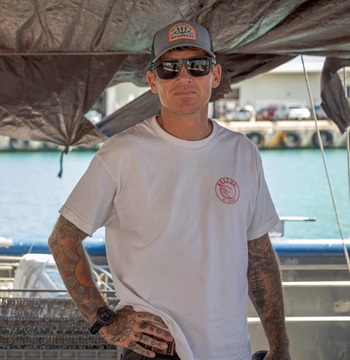 Troy Pack, the captain of the Itasca, a Hawaiʻi-based longline fishing boat, had a different outlook on his job just a few years ago. “I loved being a captain. I loved my job. I love fishing, but it’s like I was making good money and it was worth it. It was worth being away from my family and worth being away and being out at sea for 25 days a month,” Pack said. After a recent fishing trip, the Itasca was docked at Oʻahu’s Pier 38. On one afternoon, Pack, some of his crew and Peter Webster, who owns the Itasca, were taking a break aboard the vessel before heading out on another fishing trip. There, Pack said he’s been rethinking his career. After 20 years of fishing, he said he couldn’t live on the pay anymore. more, >>CLICK TO READ<< 07:09
Troy Pack, the captain of the Itasca, a Hawaiʻi-based longline fishing boat, had a different outlook on his job just a few years ago. “I loved being a captain. I loved my job. I love fishing, but it’s like I was making good money and it was worth it. It was worth being away from my family and worth being away and being out at sea for 25 days a month,” Pack said. After a recent fishing trip, the Itasca was docked at Oʻahu’s Pier 38. On one afternoon, Pack, some of his crew and Peter Webster, who owns the Itasca, were taking a break aboard the vessel before heading out on another fishing trip. There, Pack said he’s been rethinking his career. After 20 years of fishing, he said he couldn’t live on the pay anymore. more, >>CLICK TO READ<< 07:09
Trident to sell Kodiak plant to Pacific Seafood
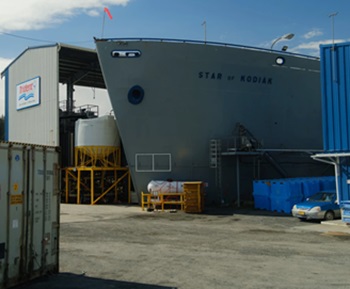 Kodiak’s largest seafood processing plant has a new owner. Trident Seafoods announced on Oct. 14 that it reached a deal with Pacific Seafood for the downtown facility. The Star of Kodiak plant in its namesake town is the last plant to sell after Trident, which is based in Seattle, announced a major restructuring plan back in December 2023, which included selling four plants in Alaska – a third of the company’s facilities in the state. Trident noted the tough state of the seafood industry for its decision – a market collapse detailed by a recent “economic snapshot” from the National Oceanic and Atmospheric Administration, which found that Alaska’s seafood industry was worth $1.8 billion less in 2023 than it was in 2022. Links, more, >>CLICK TO READ<< 09:39
Kodiak’s largest seafood processing plant has a new owner. Trident Seafoods announced on Oct. 14 that it reached a deal with Pacific Seafood for the downtown facility. The Star of Kodiak plant in its namesake town is the last plant to sell after Trident, which is based in Seattle, announced a major restructuring plan back in December 2023, which included selling four plants in Alaska – a third of the company’s facilities in the state. Trident noted the tough state of the seafood industry for its decision – a market collapse detailed by a recent “economic snapshot” from the National Oceanic and Atmospheric Administration, which found that Alaska’s seafood industry was worth $1.8 billion less in 2023 than it was in 2022. Links, more, >>CLICK TO READ<< 09:39
Fisherman’s Wharf future divides SF boaters, port
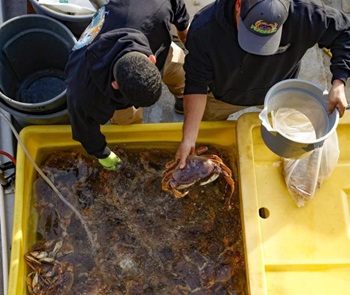 The Port of San Francisco and Fisherman’s Wharf business owners agree parts of the area need maintenance and repair. That’s where the agreement ends. The Port Commission voted Tuesday to endorse the term sheet for a $550 million revitalization of Pier 45 and a parking lot currently operated by SP+ Parking, beginning progress on an effort that would construct a seafood market, food hall, and events center and performing arts space that port officials say will revitalize the wharf’s surrounding area. “As working fishing families, we can’t simply relocate for the sake of an amusement park,” Bates said. “Fisherman’s Wharf should be for fishing.” The wharf currently supports nearly 90 commercial vessels, 21 charter fishing boats and nine historic vessels. As the only sizable commercial fishing port remaining in San Francisco Bay, boats from other ports occasionally rely on its fuel, ice and bait facilities. Bates said that out-of-town crews and vessels will also take up space along the wharf during abundant salmon and crab seasons. Photos, more, >>CLICK TO READ<< 10:42
The Port of San Francisco and Fisherman’s Wharf business owners agree parts of the area need maintenance and repair. That’s where the agreement ends. The Port Commission voted Tuesday to endorse the term sheet for a $550 million revitalization of Pier 45 and a parking lot currently operated by SP+ Parking, beginning progress on an effort that would construct a seafood market, food hall, and events center and performing arts space that port officials say will revitalize the wharf’s surrounding area. “As working fishing families, we can’t simply relocate for the sake of an amusement park,” Bates said. “Fisherman’s Wharf should be for fishing.” The wharf currently supports nearly 90 commercial vessels, 21 charter fishing boats and nine historic vessels. As the only sizable commercial fishing port remaining in San Francisco Bay, boats from other ports occasionally rely on its fuel, ice and bait facilities. Bates said that out-of-town crews and vessels will also take up space along the wharf during abundant salmon and crab seasons. Photos, more, >>CLICK TO READ<< 10:42
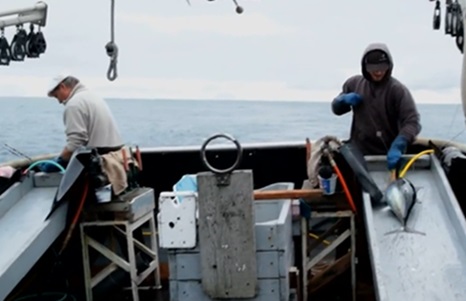
All hail the king of tuna, Oregon’s prized catch
One of Oregon’s most valuable seafoods is more popular than ever, but its nickname may fool you: chicken of the sea. It’s albacore tuna, and it is a fish that is grounded in Oregon commercial fishing history that reaches back nearly a century ago. Back then, West Coast fishermen went far out to sea in search of the albacore, also known as “chicken of the sea.” Albacore tuna entered Oregon fish markets in the 1930s when Oregon ports from Coos Bay to Astoria were home to large fishing fleets, dozens of canneries and thousands of employees who processed the catch. While Oregon’s large-scale canneries are long gone, albacore fishing techniques haven’t changed much at all, according to Steve Fick of Fishhawk Fisheries. Video, more, >>CLICK TO READ<< 09:55
Lifelong Commercial Fisherman David McCrone Pack of Bodega Bay, Ca. has passed away
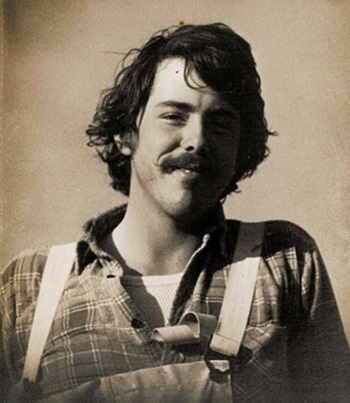 David McCrone Pack, born October 5,1957, passed peacefully to the great beyond on August 2nd, 2024, surrounded by his family and the music of the Grateful Dead. He will be remembered as a hard-working man, a friend to all animals, and a loving father. He was 66 years old. A native Californian, Dave was born to parents Jim and Beth in the redwood forest of Larkspur, California. He attended Redwood High School and soon thereafter began his life as a commercial fisherman in the San Francisco Bay, where he would eventually captain his own boat, The Blind Faith. For Dave, though, fishing wasn’t just a hobby – it was something he enjoyed alone or with friends and family and had an active fishing license every year of his adulthood. more, >>CLICK TO READ<< 08:20
David McCrone Pack, born October 5,1957, passed peacefully to the great beyond on August 2nd, 2024, surrounded by his family and the music of the Grateful Dead. He will be remembered as a hard-working man, a friend to all animals, and a loving father. He was 66 years old. A native Californian, Dave was born to parents Jim and Beth in the redwood forest of Larkspur, California. He attended Redwood High School and soon thereafter began his life as a commercial fisherman in the San Francisco Bay, where he would eventually captain his own boat, The Blind Faith. For Dave, though, fishing wasn’t just a hobby – it was something he enjoyed alone or with friends and family and had an active fishing license every year of his adulthood. more, >>CLICK TO READ<< 08:20
Central Coast fishermen sue California Coastal Commission over wind energy
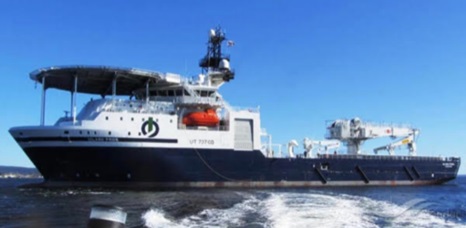 Fishermen from Morro Bay and Port San Luis recently filed a legal challenge against the California Coastal Commission for not requiring wind energy companies to abide by Bureau of Ocean Energy Management rules before providing permits for sonar testing, the second lawsuit the groups have filed against the commission. In 2022, the federal government auctioned off three offshore wind energy sites located between 20 and 30 miles off the coast near Morro Bay. Then in Dec. 2023, the state issued a permit allowing survey work to begin. The fisherman organisation’s latest lawsuit, filed on Sept. 6, argues that the Coastal Commission required the wind energy companies, including Equinor, to “have an independent liaison that is responsible for the coordination and communication of site activities with affected commercial and recreational fishing communities and harbor districts.” The fishing liaison is required to work with fishing communities and the harbor districts to coordinate survey and other activities. more, >>CLICK TO READ<< 18:18
Fishermen from Morro Bay and Port San Luis recently filed a legal challenge against the California Coastal Commission for not requiring wind energy companies to abide by Bureau of Ocean Energy Management rules before providing permits for sonar testing, the second lawsuit the groups have filed against the commission. In 2022, the federal government auctioned off three offshore wind energy sites located between 20 and 30 miles off the coast near Morro Bay. Then in Dec. 2023, the state issued a permit allowing survey work to begin. The fisherman organisation’s latest lawsuit, filed on Sept. 6, argues that the Coastal Commission required the wind energy companies, including Equinor, to “have an independent liaison that is responsible for the coordination and communication of site activities with affected commercial and recreational fishing communities and harbor districts.” The fishing liaison is required to work with fishing communities and the harbor districts to coordinate survey and other activities. more, >>CLICK TO READ<< 18:18
Galveston business entangled in net of fraud allegations and whistleblowers
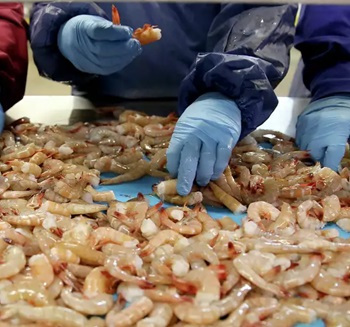 A shrimp business and former market that has been a cornerstone of Galveston for more than 45 years is in the muck, as it and its parent company are mired in a number of lawsuits alleging everything from fraud to shorting an employee. Galveston Shrimp Company was founded in 1978 by Sicilian immigrant Rosario Cassarino. For nearly 20 years, Rosario and wife Giovanna sold fish and shrimp that was brought onto the island. Their son Nello Cassarino assumed a leadership role in Galveston Shrimp Co. in 1994, and in 2011 he re-formed the company under the umbrella of Pacific Seafood, a family-owned market and business out of Portland, Ore. But now there’s a rift between Cassarino and Pacific Seafood, which owns 80 percent of Galveston Shrimp Co. According to ongoing litigation as reported by the Galveston Daily News, Cassarino is suing Pacific Seafood for $1 million, accusing the company of shorting him on revenue and self-dealing. Cassarino originally filed the lawsuit in Texas in 2023, but a judge moved the suit to Oregon. More, >>CLICK TO READ<< 10:04
A shrimp business and former market that has been a cornerstone of Galveston for more than 45 years is in the muck, as it and its parent company are mired in a number of lawsuits alleging everything from fraud to shorting an employee. Galveston Shrimp Company was founded in 1978 by Sicilian immigrant Rosario Cassarino. For nearly 20 years, Rosario and wife Giovanna sold fish and shrimp that was brought onto the island. Their son Nello Cassarino assumed a leadership role in Galveston Shrimp Co. in 1994, and in 2011 he re-formed the company under the umbrella of Pacific Seafood, a family-owned market and business out of Portland, Ore. But now there’s a rift between Cassarino and Pacific Seafood, which owns 80 percent of Galveston Shrimp Co. According to ongoing litigation as reported by the Galveston Daily News, Cassarino is suing Pacific Seafood for $1 million, accusing the company of shorting him on revenue and self-dealing. Cassarino originally filed the lawsuit in Texas in 2023, but a judge moved the suit to Oregon. More, >>CLICK TO READ<< 10:04
Helicopter Logger/Commercial Fisherman James Michael Modderman, of Brownsville Oregon has passed away
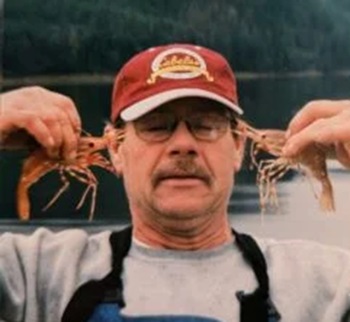 James Michael Modderman, 72, of Brownsville Oregon passed away peacefully in hospice care at Helping Hearts, Saturday, October 5, 2024. He was born November 7, 1951 at Naeve Hospital in Albert Lea, MN to Russell and JoAnn (Floyd) Modderman. In 1975, James and wife Marian moved to the Oregon coast and raised two children. James was one of the 1st in the Helicopter Logging Industry cutting cedar. He owned and operated a commercial bay crabbing boat and worked on commercial fishing boats off the Oregon coast. In 1989 James and his family moved back to Albert Lea to be closer to family. James then moved back to the Oregon coast in 2007 and in 2021 moved to Brownsville, Oregon. more, >>CLICK TO READ<< 15:56
James Michael Modderman, 72, of Brownsville Oregon passed away peacefully in hospice care at Helping Hearts, Saturday, October 5, 2024. He was born November 7, 1951 at Naeve Hospital in Albert Lea, MN to Russell and JoAnn (Floyd) Modderman. In 1975, James and wife Marian moved to the Oregon coast and raised two children. James was one of the 1st in the Helicopter Logging Industry cutting cedar. He owned and operated a commercial bay crabbing boat and worked on commercial fishing boats off the Oregon coast. In 1989 James and his family moved back to Albert Lea to be closer to family. James then moved back to the Oregon coast in 2007 and in 2021 moved to Brownsville, Oregon. more, >>CLICK TO READ<< 15:56
Offshore wind’s bogus benefits bragged on
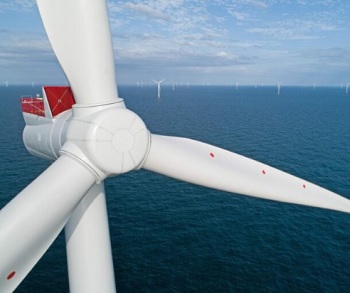 Resources for the Future (RFF) has produced a combined cost benefit analysis for 32 U.S. offshore wind projects now in development. They proudly point to the benefits outweighing the costs by a whopping 14 times. But these supposed benefits are not just exaggerated; they are fabricated. They simply do not exist. Their lengthy title is “Offshore Wind Power Examined: Effects, Benefits, and Costs of Offshore Wind Farms along the US Atlantic and Gulf Coasts”. The analysis is fairly simple which makes it easy to see the fallacies. There are just four basic benefit claims. And of course it is all based on highly questionable modeling. Before looking at each of these benefit claims it is worth noting a pervasive misconception. more, >>CLICK TO READ<< 09:18
Resources for the Future (RFF) has produced a combined cost benefit analysis for 32 U.S. offshore wind projects now in development. They proudly point to the benefits outweighing the costs by a whopping 14 times. But these supposed benefits are not just exaggerated; they are fabricated. They simply do not exist. Their lengthy title is “Offshore Wind Power Examined: Effects, Benefits, and Costs of Offshore Wind Farms along the US Atlantic and Gulf Coasts”. The analysis is fairly simple which makes it easy to see the fallacies. There are just four basic benefit claims. And of course it is all based on highly questionable modeling. Before looking at each of these benefit claims it is worth noting a pervasive misconception. more, >>CLICK TO READ<< 09:18
HUMBOLDT HISTORY: The Salmon Canneries of the Lower Eel River and the Death of a Fishery
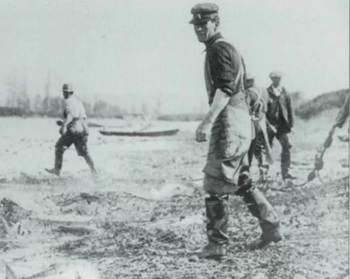 Eel River salmon have been the Humboldt Bay Region’s premier fish from time immemorial. Salmon was a major staple of the aboriginal Wiyot Indians’ diet, and when the earliest white settlements were established along the river commercial salmon fishing began almost immediately. The first extensive commercial salmon fishery on the Eel River was established in 1853 by Jesse Dungan, a successful former gold miner who had bought a 300-acre ranch in the lower Eel River valley. Other commercial salmon fishermen soon followed, often forming partnerships. Pioneer firms fishing the estuary in 1859 included Dungan & Denman, John Mosely, Martin & Plummer, Gilman & Skinner, William Ellery & Bro., Thomas Worth, Parcells & Nicholson, and Dickerman & Miller. They operated from the mouth of the river upstream to the head of tidewater — near the present Fernbridge. Photos, much more, >>CLICK TO READ<< 12:12
Eel River salmon have been the Humboldt Bay Region’s premier fish from time immemorial. Salmon was a major staple of the aboriginal Wiyot Indians’ diet, and when the earliest white settlements were established along the river commercial salmon fishing began almost immediately. The first extensive commercial salmon fishery on the Eel River was established in 1853 by Jesse Dungan, a successful former gold miner who had bought a 300-acre ranch in the lower Eel River valley. Other commercial salmon fishermen soon followed, often forming partnerships. Pioneer firms fishing the estuary in 1859 included Dungan & Denman, John Mosely, Martin & Plummer, Gilman & Skinner, William Ellery & Bro., Thomas Worth, Parcells & Nicholson, and Dickerman & Miller. They operated from the mouth of the river upstream to the head of tidewater — near the present Fernbridge. Photos, much more, >>CLICK TO READ<< 12:12






